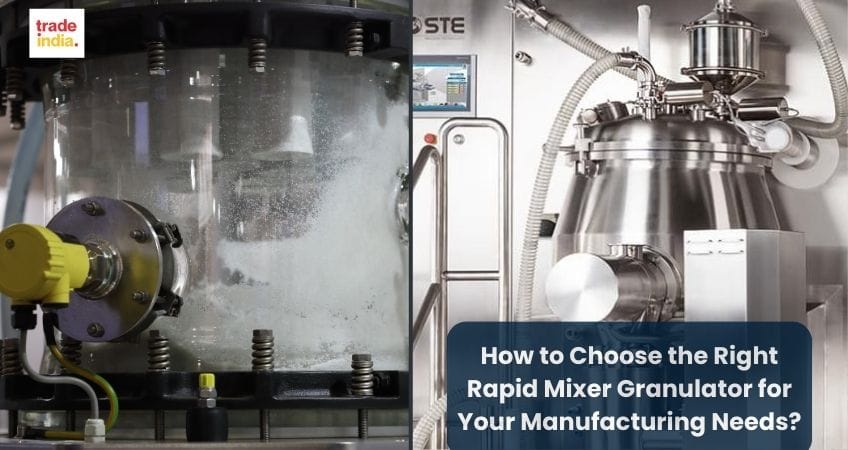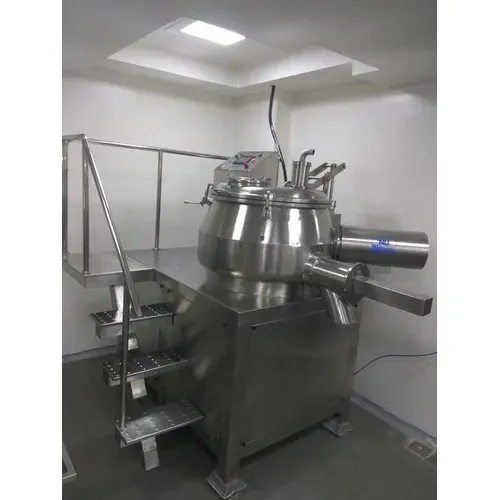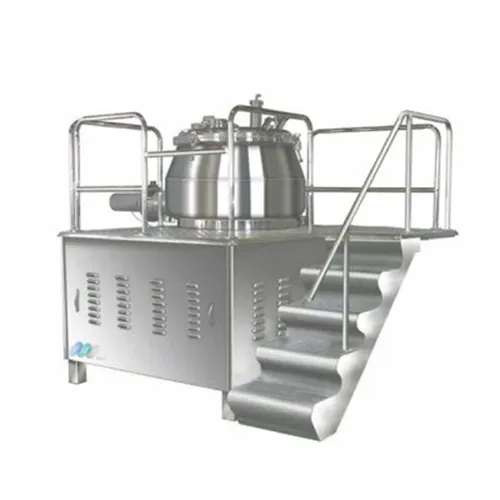How to Choose the Right Rapid Mixer Granulator for Your Manufacturing Needs?

It’s essential to choose the right equipment for specific applications, otherwise, it will hinder performance and efficiency. In the same way, selecting the right Rapid Mixer Granulator or RMG facilitates optimal performance during the manufacturing process. Available in various features, customizations, and models, the selection of this equipment may trouble some businesses. This article will share in-depth knowledge to help you make the right decision.
What is a Rapid Mixer Granulator?
A Rapid Mixer Granulator or RMG, is an industrial-grade mechanical equipment used across various industries including food, chemical, pharma, etc for an efficient and consistent mix of ingredients and convert them into granular form. The process combines multiple stages including belding, wetting, and granulating, and the machine does all this in one go, too while offering high-quality granules. Moreover, because of such efficiency, reliability, and fast processing time, RMGs are highly preferred for manufacturing tablets, capsules, etc.
Common Applications of Rapid Mixer Granulator in Various Industries
Pharmaceutical Industry
Rapid mixer granulators are most commonly found in the pharmaceutical industry for mixing various ingredients efficiently and facilitating the granulation of powders, which is essential for producing medications like tablets and capsules. The major advantage of RMGs is that products achieve uniform size and consistency because of the distribution of active ingredients during the mixing and granulation process.
Food Industry
In the food industry, producing various products requires consistent and efficient mixing of different ingredients according to specific dosages. Such efficiency and uniform levels can only be provided by a rapid mixer granulator. Moreover, for achieving the desired texture and appearance of food products, the granulation process must be of high quality, also achieved through RMGs.
Chemical Industry
As for the chemical industry, the Rapid Mixer Granulator facilitates quick processing of ingredients including effective mixing and granulation. These items include fertilizers, pesticides, dyes, pigments, and detergents. The equipment provides stability and uniformity to the chemical formulations, helping achieve effectiveness. Moreover, the granulation process of RMG enhances the efficiency of material handling, storage, and transportation.
Cosmetics Industry
Cosmetic industry employees use Rapid Mixer Granulator to efficiently manufacture pressed powders, eyeshadows, and blushes. The machine facilitates the granulation of powdered ingredients used to manufacture these cosmetic products. In addition to this, the creams and lotions require uniform and consistent mixing for which the RMGs are extensively utilized, offering the desired texture and effectiveness to the products. Ultimately these cosmetic products offer desired results to the consumers.
Dietary Supplements
Rapid Mixer Granulators are extensively hired in dietary supplement manufacturing plants, facilitating the production process. During one of the production phases, RMGs offer efficient mixing of ingredients that provide uniform distribution throughout the content, sustaining consistent flavor, taste, texture, and appearance. The effective mixing and granulation process of various powders helps manufacture tablets and capsules that offer great results.
Consider Your Manufacturing Needs
Identifying Your Production Goals
The very first step towards choosing the right Rapid Mixer Granulator is to consider your manufacturing needs. This includes what will be the product, its desired outcomes, its form, the ingredients, and its texture. To achieve remarkable product quality and results, you will need to consider all the factors of the manufacturing process.
Determining Batch Size and Production Volume
The next step would be to identify how much volume you need to produce and deliver in the market. Once decided, segment the total volume into equivalent batch sizes needed to prepare to achieve it. The batch size is equal to the quantity of material processed in one single production process. Understanding these factors will help you purchase the right RMG with the desired production capacity.
Considering Material Properties and Characteristics
Finally, consider the properties and characteristics of the materials you will be processing. Different materials have varying physical and chemical properties that can affect the mixing and granulation process. Factors such as particle size, density, moisture content, and flowability need to be taken into account. Choosing an RMG that can effectively handle your specific material properties ensures optimal performance and product quality.
Steps to Choose the Right Rapid Mixer Granulator
Understand Your Application Needs
To choose the right Rapid Mixer Granulator (RMG) or Mass Mixer, start by understanding your application needs. Consider the physical and chemical properties of the materials you will be processing, such as particle size, moisture content, and flowability. Determine the average and maximum batch sizes you plan to process to ensure the granulator has appropriate capacity. Additionally, specify the desired granule size distribution and uniformity to meet your product specifications.
Technical Specifications
Review the technical specifications to match the RMG with your requirements. Ensure the granulator can handle your typical batch sizes efficiently by checking its capacity. Verify the power supply specifications to ensure compatibility with your facility. Evaluate the machine's efficiency by considering the time it takes to achieve the desired granule quality, focusing on mixing and granulation time.
Design and Construction
Consider the design and construction of the RMG. Ensure it is made of materials compatible with your product and adheres to regulatory standards, such as stainless steel for pharmaceuticals. Look for features that facilitate easy cleaning and maintenance to minimize downtime and ensure hygiene. Safety features, such as emergency stops and overload protection, are essential to ensure safe operation.
Process Control and Automation
Choose an RMG with a control system that suits your process complexity, whether it's basic manual controls or advanced automated systems with programmable logic controllers (PLC). Consider models with sensors and monitoring systems to track parameters like temperature, pressure, and humidity in real-time, enhancing process control and product consistency.
Manufacturer and After-Sales Support
Select a reputable manufacturer with experience in your industry to ensure reliable performance and compliance with industry standards. Ensure the manufacturer provides comprehensive after-sales support, including installation, training, and troubleshooting. Verify the availability of spare parts and the manufacturer's commitment to providing them promptly to avoid operational delays.
Cost Considerations
Balance the features and specifications you need with your budget. Avoid compromising on critical features for cost savings, as this could affect performance and efficiency. Consider the long-term operating costs, including energy consumption, maintenance, and potential downtime, to make a cost-effective decision.
Compliance and Standards
Ensure the wet granulator complies with relevant industry standards and regulations, such as GMP for pharmaceuticals. Choose a manufacturer that provides thorough documentation and validation support for regulatory compliance, ensuring your processes meet required standards.
Major Benefits of Having a Rapid Mixer Granulator
Efficient Mixing and Granulation
RMGs are designed to provide efficient mixing and granulation in a single unit, which reduces processing time and improves productivity. The high-speed impeller and chopper work together to ensure uniform mixing and consistent granule size.
Improved Granule Quality
The rapid and thorough mixing action of RMGs results in high-quality granules with uniform size distribution. This leads to better flow properties, compressibility, and uniformity in the final product, which is critical in tablet formulation.
Reduced Processing Time
RMGs significantly shorten the granulation process compared to traditional methods. The efficient design allows for faster mixing, wetting, and granule formation, which reduces overall batch processing time and increases throughput.
Scalability
RMGs are available in various sizes, making them suitable for both small-scale R&D and large-scale production. This scalability ensures that the same granulation process can be replicated across different production scales, maintaining product consistency.
Flexibility in Formulation
RMGs can handle a wide range of formulations, including those with varying particle sizes, moisture content, and viscosities. This flexibility allows manufacturers to develop and produce diverse products using the same equipment.
Improved Process Control
Modern RMGs come with advanced control systems that allow precise control over process parameters such as impeller speed, chopper speed, and mixing time. This ensures consistent and repeatable results, which is vital for meeting regulatory standards.
Ease of Cleaning and Maintenance
RMGs are designed for easy cleaning and maintenance, with smooth surfaces and minimal dead spaces where residues can accumulate. This reduces downtime between batches and ensures high levels of hygiene, particularly important in pharmaceutical production.
Cost-Effectiveness
By combining mixing and granulation in one unit, RMGs reduce the need for multiple pieces of equipment and associated space, labor, and maintenance costs. The increased efficiency and reduced processing time also contribute to lower operational costs.
Explore More:


